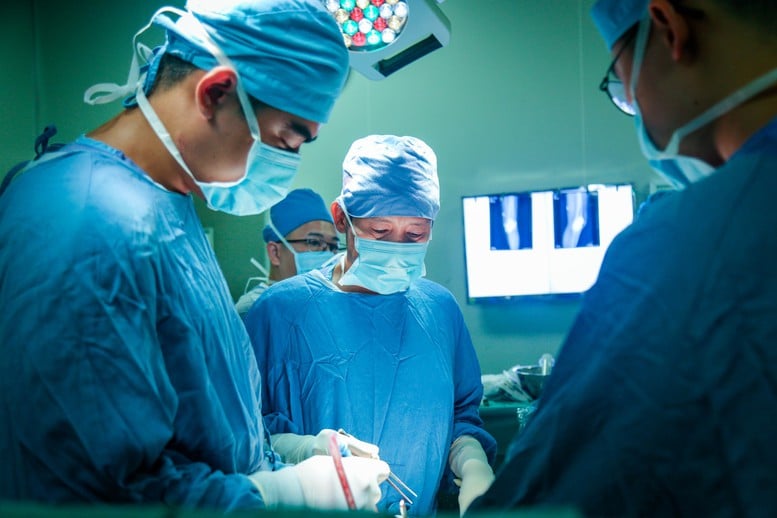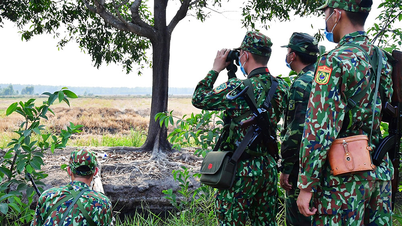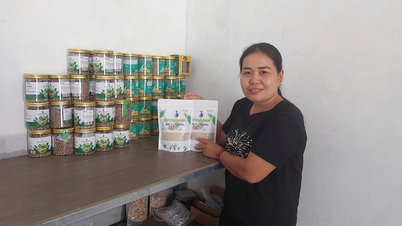
Artificial knee replacement surgery for a patient right after the workshop - Photo: VGP/HM
Knee replacement is often indicated for patients with severe, persistent knee osteoarthritis that does not respond to conservative treatments. However, a knee surgery is considered successful when all postoperative infection problems must be strictly controlled.
This information was confirmed by domestic and foreign experts at the workshop "Artificial knee joint infection and treatment methods" organized by Viet Duc Friendship Hospital and Vietnam Orthopedic Trauma Association on July 30.
"Infection is like a disaster"
According to Associate Professor, Dr. Nguyen Manh Khanh, President of the Vietnam Orthopedic Association, Deputy Director of Viet Duc Friendship Hospital, in artificial joint replacement surgery, including knee replacement, like all other types of surgery, there is a rate of post-operative infection. Normally, this rate ranges from 1 to 3%.
However, in the field of artificial joint replacement, infection is considered a disaster for patients.
"Artificial joints essentially replace the patient's old joints and will stay in the patient's body forever. If infected, it is a disaster, or in other words, the biggest challenge for joint replacement surgery is to eliminate all infection problems," Professor Khanh shared.
Sharing with reporters, Associate Professor Nguyen Manh Khanh said that patients with knee replacement indications are mainly concentrated in the group with severe, long-term knee osteoarthritis that does not respond to conservative treatment methods. These patients account for 70-80% of those with knee replacement indications, the rest are the group with knee osteoarthritis after trauma or sports .
There are two types of knee osteoarthritis, including primary knee osteoarthritis and secondary knee osteoarthritis. Primary knee osteoarthritis has no clear cause and accounts for about 50% of people with knee osteoarthritis. The remaining 50% is secondary knee osteoarthritis, which often occurs after arthritis or after autoimmune diseases...
The causes that can lead to post-operative infection are indicated by many factors such as during the dressing change, sharing forceps, scissors... or the patient does not use antibiotics as prescribed by the doctor, patients with underlying diseases (diabetes, obesity, autoimmune diseases) are also at higher risk of infection.
Update on advances in infection treatment
In order to update the world's new points in this field, on July 30, the Vietnam Orthopedic Association invited Thorsten Gehrke, Medical Director of ENDO Clinic Hamburg - one of the leading experts in the Federal Republic of Germany as well as in Europe in the field of joint replacement surgery in general, especially surgery to treat infections after artificial joint replacement in particular, to Viet Duc Friendship Hospital, to give a lecture to update knowledge, as well as to coordinate with the doctors of the Hospital to perform a case of infection after artificial knee replacement.
At the conference, new knowledge and advances in the treatment of artificial joint infections were shared through specialized reports such as: Treatment of severe bone defects in knee replacement; Diagnosis and treatment of artificial joint infections. The shared and updated contents have contributed to improving the quality of treatment, aiming at the goal of more comprehensive and safer care for patients after artificial joint replacement surgery.
At Viet Duc Friendship Hospital - the country's final surgical hospital, the number of patients undergoing knee surgery is currently equal to that of patients undergoing hip surgery.
Previously, the rate of patients having joint replacements at the hospital was 90% hip replacements, and only 10% knee replacements. Now, the rate of patients having knee replacements ranges from 30 - 40%.
In the past, if suffering from knee osteoarthritis, patients often endured it and did not go to the doctor, which seriously affected their quality of life. Nowadays, due to the high level of education and the ability to access medical information quickly and accurately, the number of patients going to medical facilities for examination is higher.
Currently, the cost of knee replacement surgery is covered by health insurance. Depending on the different types of joints, each knee replacement costs about 50 million VND. However, experts also note that not all cases of osteoarthritis are indicated for artificial joint replacement. Early diagnosis, proper intervention and application of modern treatment methods appropriate to each patient's case will play a key role in controlling and restoring joint function for patients.
Hien Minh
Source: https://baochinhphu.vn/nhiem-khuan-tham-hoa-trong-phau-thuat-thay-khop-goi-102250730161213146.htm




































































































Comment (0)